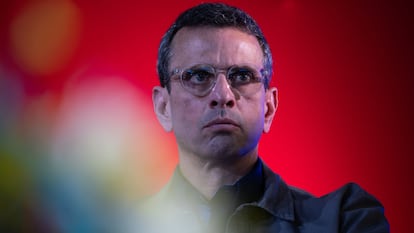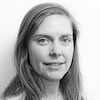Henrique Capriles: ‘Venezuela needs fewer extreme voices on both sides’
The opposition leader discusses with EL PAÍS why he withdrew as a candidate in the upcoming primaries


Henrique Capriles began swimming against the tide years ago, and now he is unexpectedly doing it again. Just four days ago, the Venezuelan opposition leader surprised everyone by announcing his withdrawal from the primaries scheduled for October 22. It won’t change the primaries much, as María Corina Machado leads all opposition candidates by a wide margin. However, Capriles is still a key figure in an opposition movement with squabbling factions trying to unite against the ruling regime.
In his first interview following the announcement, Capriles explained his reasons for withdrawing after being disqualified by Venezuelan electoral authorities. He offered his opinions on Machado (also disqualified), the primaries and his expectations for the presidential elections in 2024.
Question. You withdrew from the primaries unexpectedly a few days ago. Does your decision undermine the entire process?
Answer. I believe it will simplify things. My objectives were twofold: first, to amplify the voices of vulnerable Venezuelans; and second, to emphasize the importance of electoral participation to nominate a competitive candidate to run against Maduro in 2024. Even the most extreme voices say we need to participate in the 2024 elections. This has always been one of my priorities, and not participating in the primary doesn’t mean I’m no longer committed to our cause.
Q. What should voters who were considering voting for you do on October 22?
A. Everyone should make the decision that seems best to them. We’re fighting to win an election against an undemocratic regime, and I feel we shouldn’t avoid discussing the electoral disqualifications with voters. I’m leaving this process to facilitate that discussion. I have been disqualified for six years, and despite my hope of someday regaining my political rights, I’m still disqualified. The country needs a candidate who can do more than just win a primary. While I’ll support and fight for my candidate, it’s important to acknowledge the reality that we have all been disqualified. I can’t expect a dictator like Maduro to lift the disqualification. Ignoring reality and believing that we can force Maduro to do anything is unrealistic. No one here accepts Maduro’s disqualifications, unconstitutional acts and atrocities. Let’s accept reality and find the best way to face it.
Q. Do you think the rest of the disqualified candidates should also withdraw?
A. My message was not intended for any of the disqualified candidates. It’s a personal decision to enable another candidate who is not disqualified to run. I think that will help Venezuelans choose a candidate. Unfortunately, I can’t run since I’m disqualified. My hopes were raised by the earlier negotiation process that received international support, but that’s beyond my control. What I can do is help a candidate who has a chance of beating Maduro, and clearly I can’t be that candidate.
Q. If you were leading the polls, would you have still withdrawn?
A. That’s what my detractors are saying, that I withdrew to avoid certain defeat. But no, politicians win and lose — I’m not afraid of losing. No, I wanted to shake things up so we could discuss what’s most important to me — bringing about change in 2024 for Venezuela. Personal ambitions must be put aside if favor of the vast majority of Venezuelans who hope for a viable opposition candidate. If someone else has a better chance than me of being that person, go for it.
Q. The Maduro regime has used disqualifications to undercut the opposition. Don’t you think that anyone who starts getting some support will ultimately be disqualified?
A. Well, take a look at the 2021 elections in Barinas state. The opposition candidate for governor was disqualified after winning the election. When his wife was put forth as a substitute, she was disqualified. Then her substitute was also disqualified. Finally, a fourth candidate became governor in a state that had been controlled by the [Hugo] Chávez family for the last 20 years. I don’t think Maduro has the power to disqualify 28 million Venezuelans. However, we shouldn’t count on a messiah to save us. Maduro can certainly keep on disqualifying candidates, which is why the elections don’t end on October 22. It’s crucial to establish clear rules on how to handle potential disqualifications. I hope politicians can prioritize common interests over personal ambition, develop some rules to follow so we can have a strong candidate to defeat Maduro.
Q. Do you think María Corina Machado’s candidacy will be viable if she wins the primary?
A. I want all the disqualifications lifted. It doesn’t matter what I think is viable or not. My message is not directed at any one individual. I think it’s time for me to step aside, and that’s a personal decision. I’m not harming anyone. I still believe that the most powerful weapon Venezuelans have is the vote. I was among those who criticized all the artificial and unrealistic policies of the interim government [after Maduro’s illegitimate election in 2018]. What has been the impact of those policies? Completely negative.
Q. Which candidate do you endorse?
A. My candidate is the primaries and unity.
Q. What if Machado wins?
A. Then I’ll support her. But my candidate will always be free and fair elections. I don’t believe in shortcuts or coercion. Venezuela needs fewer extreme voices on both sides.
Q. Do you think María Corina Machado is one of those extreme voices?
A. I have significant disagreements [with her] on social issues and on how to approach a transition. I have always focused on fostering dialogue rather than conflict. But her approach is confrontational, and I think achieving change in Venezuela requires acknowledging the adversary and moving away from the all-or-nothing mindset that has crippled us.
Q. Why has Machado’s approach connected with so many people?
A. Venezuela is experiencing a period of anti-political sentiment, of distrust in traditional politics. It’s not the first time we’ve been here. That’s why I am so worried that anti-politics will lead us to a dead end.
Q. What should be done if she wins the primary but can’t register to run for president?
A. I’ll support whoever wins the primary, but we’re still unsure if the disqualifications will be lifted. If they’re not, Maduro will win every time. I think we should discuss every scenario with the primary winner and develop responses. This way, if Maduro doesn’t lift the disqualifications, the opposition will still have options to pursue.
Q. The primary will be self-managed by the opposition parties — how will that work?
A. It’s a huge challenge, I hope it turns out well, but it’s not easy. I don’t know exactly where I’m supposed to vote yet. I always thought the primary should be conducted with the assistance of the National Electoral Council (CNE), but in the end we decided it would be self-managed.
Q. What do you think about the recent news regarding the potential resumption of opposition talks in Mexico?
A. I hope it happens. I’m a Venezuelan who seeks agreement, not just for political stability, but also to address the economic and social recovery. Venezuelans are worried less about the political conflict than about the dire economic and social situation — the monthly minimum wage is a paltry four dollars. We won’t be able to fully exploit our abundant oil until an agreement is reached.
Q. Despite your withdrawal, are you optimistic about 2024?
A. To achieve true change in Venezuela, it’s crucial to approach the situation pragmatically. Negotiation plays a vital role, as the transition from an authoritarian regime to a full democracy cannot be achieved solely through an election. Many things have to happen before the regime will accept a democratic transition of power. Some want to completely eliminate the regime and the Chavista movement. But the focus should be on enabling democratic recovery rather than indulging in empty rhetoric. Let’s prioritize practical actions over words, despite the potential political ramifications.
Q. Do you plan to retire from politics?
A. No, this is my calling, I am a social advocate. I will keep fighting for the most vulnerable, for social justice, and for PDVSA [the national oil company] to remain a company that benefits all Venezuelans. Some want to sell it, but what will that do for us? Are we going to sell our country’s primary source of income? How will the people afford water and electricity? This goes beyond ideologies — it affects the whole nation.
Q. Do you think the Maduro regime is celebrating your withdrawal?
A. Of course — and the first one was Diosdado Cabello [a member of the National Assembly and a captain in the armed forces].
Q. Aren’t you then playing into their hands?
A. No — I am one of their biggest threats, which is why I was disqualified.
Q. Have you thought about leaving the country?
A. No, my three children are Venezuelan and they’re going to grow up here.
Sign up for our weekly newsletter to get more English-language news coverage from EL PAÍS USA Edition
Tu suscripción se está usando en otro dispositivo
¿Quieres añadir otro usuario a tu suscripción?
Si continúas leyendo en este dispositivo, no se podrá leer en el otro.
FlechaTu suscripción se está usando en otro dispositivo y solo puedes acceder a EL PAÍS desde un dispositivo a la vez.
Si quieres compartir tu cuenta, cambia tu suscripción a la modalidad Premium, así podrás añadir otro usuario. Cada uno accederá con su propia cuenta de email, lo que os permitirá personalizar vuestra experiencia en EL PAÍS.
¿Tienes una suscripción de empresa? Accede aquí para contratar más cuentas.
En el caso de no saber quién está usando tu cuenta, te recomendamos cambiar tu contraseña aquí.
Si decides continuar compartiendo tu cuenta, este mensaje se mostrará en tu dispositivo y en el de la otra persona que está usando tu cuenta de forma indefinida, afectando a tu experiencia de lectura. Puedes consultar aquí los términos y condiciones de la suscripción digital.








































